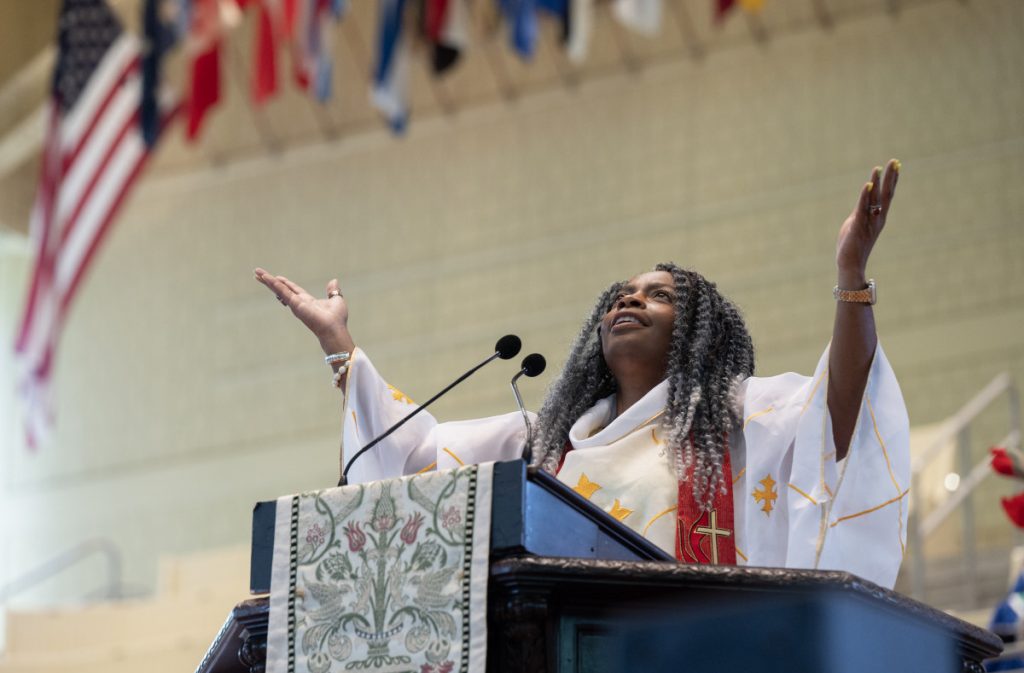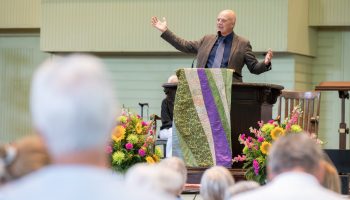
Bishop Cynthia Moore-Koikoi delivers her sermon “The Declaration of Independence: We are Free from Grandma’s Context” during the morning worship service.
As Bishop Cynthia Moore-Koikoi considered what she was going to preach about this week at Chautauqua, she asked herself, “What kind of person comes to Chautauqua when the theme is AI and would choose to explore this topic on the Fourth of July?”
Her answer?
“You all are a pretty peculiar group of people,” she told the congregation, “so I will attempt to honor your unique nature.”
Moore-Koikoi preached at the 10:45 a.m. Sunday morning worship service in the Amphitheater. Her sermon title was “The Declaration of Independence: We are Free from Grandma’s Context,” and the scripture reading was Galatians 1:13-24.
Paul’s letter to the Galatians is sometimes called the Christian Declaration of Independence, she said, and so: “I wanted to explore the Christian declaration, not the document that speaks to the Americas.”
Moore-Koikoi began her sermon with a reflection on Paul’s greeting of grace and peace to the Galatians.
“Grace and peace is yours through the life, death and resurrection of Jesus,” she said. “Whether you think of him as just a man, a prophet or a savior, may you be so fully assured that you are free from the things of this world. Bask in grace; marinate in peace.”
While Paul started his letter rather politely, he became more persuasive and less polite as the letter proceeded.
“The highlight of the letter is the declaration of freedom found in Jesus and the cross,” Moore Koikoi said. The Galatians cannot go back to being slaves.”
The men who wrote and signed the U.S. Declaration of Independence declared their freedom and then had to work to make it happen.
“Christian freedom is not of our own doing,” Moore-Koikoi said. “Our freedom is not a good work of our own faithfulness, but is God’s choice and made possible through Jesus Christ. Because this freedom is not dependent on our faith, it is available to all — Jew, Muslim, Hindu, Buddhist.”
She continued, “Christians don’t have a hallmark on this freedom. We are all free from the spiritual context that my ancestors didn’t think possible.”
Shortly after Moore-Koikoi began her time as bishop, she made a journey around the region she had been assigned. She would make one-day trips to see the outreach or impact ministries in the area, have lunch with the clergy, dinner with the laity and then there would be a worship service for all.
At one gathering, at the end of worship, an older white woman — “a seasoned saint” — walked up to her and threw her arms around Moore-Koikoi and “hugged me as if I was her grandchild,” she said.
The woman said, “I am a racist, my parents taught me to be, but I love you.”
“Beloved, I struggled to bring grace and peace to that moment,” Moore-Koikoi said to the Chautauqua congregation. “I was pulled back into the narrative my ancestors taught about racists.”
She continued, “I am here to witness to you that the work of the Holy Spirit is real. I felt myself melting in her arms. I said, ‘I love you, too.’ Both of us had been liberated from the context of our grandmothers. She assumed I could not love Jesus but she tasted what it means to be free from grandma’s context, to be free to love.”
Moore-Koikoi had been liberated, too, and Jesus enabled both to break out of their bondage and trust the experience of love.
“Maybe our ancestors were wrong about something pretty significant,” she said. “We need to break free of the old context and admit our ancestors were wrong. It would be easy to admit they were wrong if they were abusive. But if they were generally caring, church-going people, it is hard to examine them critically and easy to be enslaved (to their context).”
Paul hated a whole group of people — Christians — and hastened the death of some. It would be easy to condemn Paul’s ancestors for his actions.
However, as president of the board of directors of the General Commission on Religion and Race, Moore-Koikoi has found that no group of people is without prejudice, no matter race, religion or culture.
“It is the water in which we swim; we don’t even realize we are wet,” she said. “We would be so blessed to be freed like Paul, liberated so quickly and completely. For us, it is a gradual and painful process, usually in young adulthood. All of us wrestle to be free of our grandparents’ context. The world likes to convince us that because they were wrong about one thing, they were wrong about everything.”
Moore-Koikoi told the congregation that our ancestors could have been good and faithful people, but wrong about some things.
“We can honor them and still be critical. We can honor our denomination, our political party, our nation and still be critical — critical and loyal,” she said.
Don’t let your ancestral context keep you from having a Juneteenth experience, she told the congregation.
“You are free from the bondage of the world,” she said. “Tell the ancestors their bondage had been in the mistakes they made. Maybe if you tell them about your liberation, you will set them free also.”
Moore-Koikoi closed her sermon saying, “There is a phrase in some African American communities that we say when we are acting enslaved to encourage each other to accept our freedom. Most of you can’t use it since you are not African American, but we say ‘We’s free now, y’all. We’s free.’ ”
The Rt. Rev. Eugene Taylor Sutton, senior pastor of Chautauqua Institution, told the congregation they could be African American for half a minute and had them repeat, “We’s free now, y’all.”
The Rt. Rev. Eugene Taylor Sutton, senior pastor of Chautauqua Institution, presided. Shannon Rozner, senior vice president, general counsel and corporate secretary at Chautauqua, read the scripture. The prelude was “Psalm 75,” by Emma Lou Diemer, played by Joshua Stafford, director of sacred music and Jared Jacobsen Chair for the Organist, on the Massey Memorial Organ. The Chautauqua Choir, under the direction of Stafford, sang “Do not be afraid,” music by Philip Stopford and words by Gerard Markland. The choir also sang “The God who gave us life,” from The Testament of Freedom, music by Randall Thompson and words by Thomas Jefferson. The choir was under the direction of and accompanied by Stafford. The postlude, played by Stafford, was “Toccato,” from Suite No. 1 for Organ, by Florence Price. Support for this week’s chaplaincy and preaching is provided by the Geraldine M. and Frank E. McElree, Jr, Memorial Chaplaincy Fund.




